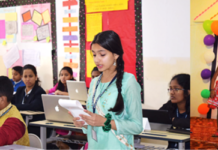[vc_row][vc_column][vc_column_text]
As India scrambles through the second and tougher wave of Covid19 there are anxieties not only related to the crumbling healthcare system but also prolonged home confinement especially for children into their second consecutive year of online schooling. Arjun and Muskan, aged 17 and 14, represent millions of children in India and around the world who have had their best schooling years confined to the four walls of their house dividing their time on nonstop online classes, television and video games.
Like other children Arjun and Muskan too had reconciled to the vagaries of living under the shadow of a pandemic for one excruciatingly long year waiting patiently for things to improve. They were banking on the launch of vaccines which they thought could assuage the ambers of the raging corona, but this was not to be. Prospects of another year of confinement put them off.
A disheartened Arjun bemoaned, “Looking at the severity of the second wave of the pandemic we have no hope of getting back to schools this session too.”
Like other children, Arjun too was quite excited about the transition from virtual to real school from the new academic session 2021-22. But all his hopes dashed to smithereens with the pandemic returning with a vengeance. “We thought with the vaccines in place Covid19 cases would recede by January-February and as things gradually get back to normal and we could be able to have physical classes,” he said with a lament in his voice.
While Arjun is studying in Class 12, his sister Muskan is in Class 10 board, both in the most crucial year of their academic life. In the past one year, they could be able to somehow adjust to the online education experience but at the moment this seems to have become a new normal which they had not bargained for. So far as academics are concerned, they are not unduly bothered. “With one year of online-education experience we can easily manage it now. The biggest worry for us is of losing those important years of schooling to the pandemic,” rues Arjun.
Elaborating on his anxieties, he said, “It’s the time for making friends and look forward to sharing a lifelong bond, maintaining a relationship with the teachers and the school. Once in higher classes, we would have no time for all this give the academic burden of education system. Unfortunately, we are missing out on both the curricular and co-curricular activities. These are the crucial years for preparation of our portfolios. But we are missing out on all the fun we have in higher classes along with the sports.”
Children apprehend that they could end up another year in confines at home. No longer interested in online games or internet series, many of them have no clue as to how to spend time beyond the academics. The time on mobile phones and TV screens are cut short in view of the realisation of the adverse impact of prolonged screen-time and parental restrictions. In such a scenario, there hardly is an opportunity for constructive engagement beyond the online classes.
What the children are thinking during pandemic confinements? So, what is their thought process? “It is tough to negotiate with parents for small little things. Even when cases had started falling during January-February, I used to have a tiff with my mother almost on a daily basis, it’s about permission to go out and play or jog in the park. My mother always remained apprehensive about my safety. Even if she allowed me to go out, she would keep calling me non-stop to ensure my wellbeing. There were loads of dos and don’ts to be followed. This irritated me no end and I often ended up arguing with her almost daily,” recounts Arjun, who has been a sportsperson and played regular tennis in a leading academy of Delhi till pandemic broke in 2020.
Muskan, his sister, on the other hand, is a tough negotiator as far as screen time is concerned. She confesses her average screen time is three to four hours daily. She is in constant tussle with her mother while negotiating for the screen time. Their mother says, “As a home lover, she never liked spending time outside. The pandemic has given her the reason to be home. Despite my best efforts, I could not cut down on her screen time. She has lost interest in academics and I can clearly see diminishing academic understanding in her. But my choices are limited as I am myself a professional and can’t remain on her side 24×7.”
Both the siblings are poles apart by nature. But they reflect the anxieties common among millions of children worldwide forced to spend their crucial teen years in confinement. While human sufferings, including loss of lives, economic crisis and the psychological fallout of the pandemic on adults and elderly is uppermost on our mind, we fail to take into account the ordeal children especially of adolescent teenagers are going through with all the restrictions on physical movement and their mental and emotional well-being.
How prolonged confinement at home impacts children?
According to a study published in Pakistan Journal of Medical Sciences during the current pandemic times (by Nazish Imran, Irum Aamer and Sadiq Naveed), not much has been analysed about how pandemic confinement is impacting children. According to the authors, theirs was the first systemic review to assess psychological impact of quarantine in children and adolescents.
The study elaborates how the pandemic confinement impacts children in various ways including:
Psychological issues
Common reaction of children and adolescents to disasters depends on the age and developmental level of the child. While younger children may be clingier or regressive in behaviour, older children may become more anxious, aggressive, restless and withdrawn while in quarantine. Children subjected to quarantine in pandemic disasters are more likely to develop acute stress disorder, adjustment disorder and grief and reported four times higher scores of PTSD (Posttraumatic stress disorder) compared to those who were not quarantined.
The Stigma
Although not much has yet been explored about the impact of stigma due to Covid19, studies available out of quarantine due to Ebola, Sars suggest that stigma linked with quarantine have real implication for children’s social relationships at community level and contribute to significant psychological distress.
Physical Health
According to the study, confinement during the pandemic is likely to have negative effects on children’s physical wellbeing and it has been documented in recent Covid-19 pandemic studies as well. Children during school days are physically more active, have regular sleep patterns and less screen time, while increased screen time, less physical activities and poor dietary patterns leading to weight gain is reported during summer vacations and weekends.
Education
There is compelling evidence that school closure as a disease containment measure during outbreaks like influenza can dramatically reduce the spread of disease but there may be high cost of prolonged school closures among children and adolescents. The United Nations Educational, Scientific and cultural Organisation highlighted that with mass school closures in more than 188 countries during the Covid19 pandemic, “the global scale and speed of the current educational disruption is unparalleled”.
Socialisation
Another area of concern during quarantine is increased rates of child abuse, neglect and exploitation while children stay at home and it may go unchecked due to social isolation.
Social distancing measures can worsen feelings of loneliness and isolation. Children need to stay connected with family and friends which get difficult with school closures, limited visits with friends and families etc.
Parental perception
Since many parents isolated at home are bound to be under lots of stress, this parental stress has been shown to predict stress reactions in children. Parents, therefore, need to maintain their own calm.
How to deal with confinement stress in children
Lancet Commission on the future of the world’s children urges various stakeholders to ensure that all children’s needs are met during these uncertain times as “early investment in children health, education and development has benefits and compound throughout child’s lifetime and societies as a whole”.
Other remedial measures to combat stress among children due to prolonged confinement in pandemic can be met by,
– Positive parenting
– Social distancing and not social isolation
– Seeking professional help
As confinement and quarantine are essential to contain the pandemic, steps need to be taken to make this experience less traumatic for young people. This can be done by honest and age developmentally-appropriate communication, ensuring routines and minimising disruptions in studies, encouraging healthy lifestyle, enhancing positive relationship between families, managing parental stress and incorporation of health promotion activities in school curriculum.
[/vc_column_text][/vc_column][/vc_row]
Disclaimer: We do undertake rigorous checks on content provided by contributors before publishing the same. If you come across some factual errors, kindly bring this into our notice and we shall review your objection and claim as per our policy and display correction credits and corrections on the article itself.
The opinion expressed in the article is of the writer. Writer is a freelance journalist/journalist based in Delhi





























